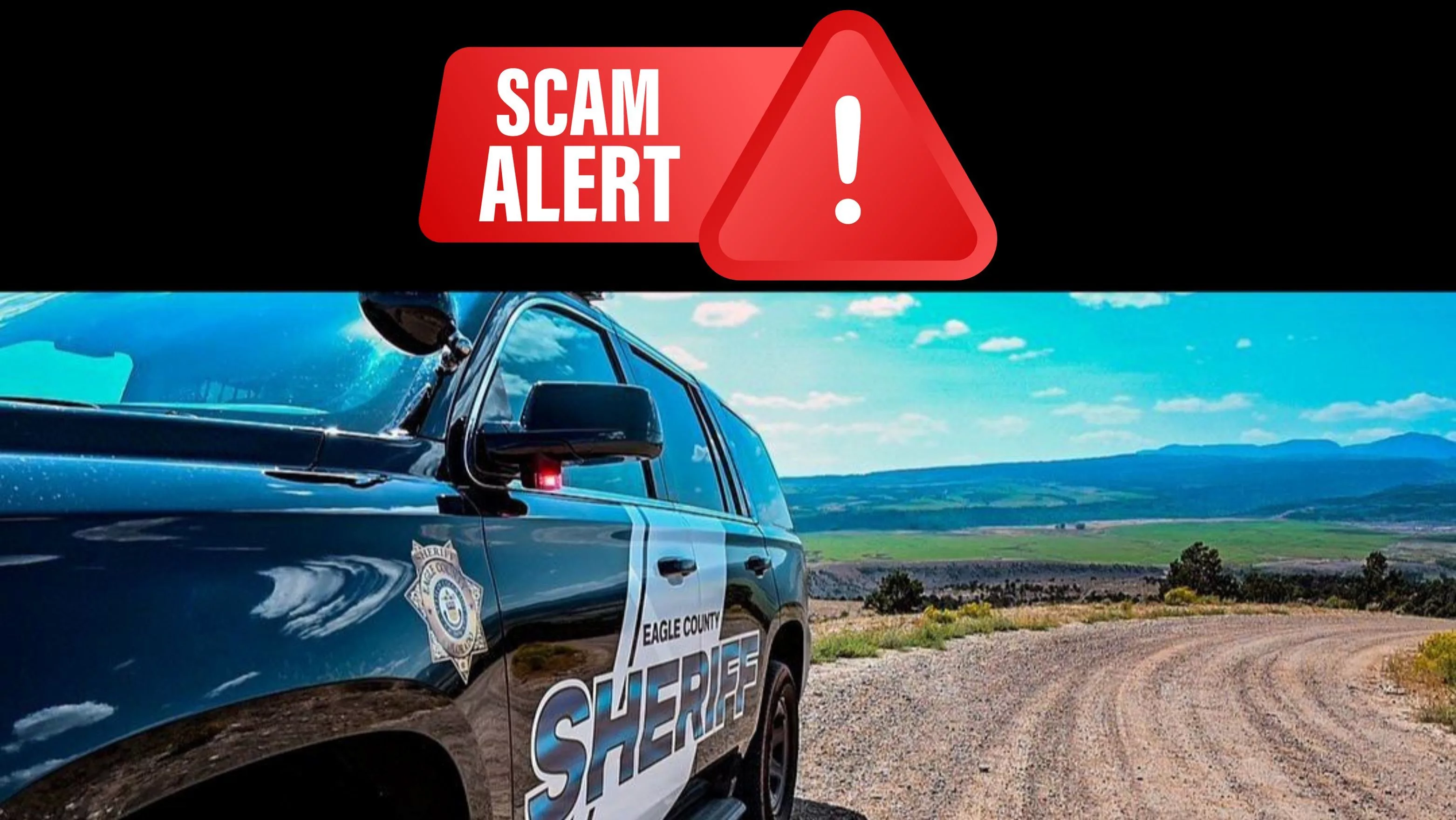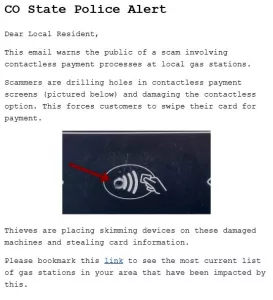
By Shannon Lukens.
Scammers are back at it, trying to take your money. A scam has been circulating where the scammers say they are local law enforcement, and you’re in trouble. But if you pay thousands of dollars, they say you’ll be OK, and out of trouble. It’s a scam. Don’t give them your money or access to it. Don’t get gift cards to give to them.
Since first posting this story, Colorado State Patrol sent word of an online scam about a list of gas stations affected by credit card skimming devices. Don’t click on that link either. The full email is below.
Craig Police Chief Mike Cochran says it has been happening in the area, where people pretend to be with local law enforcement.
“That pretend to be people with the law enforcement agency requesting money be sent for a warrant or a missed court date, so always confirm where you’re donating your money.”
The Eagle County Sheriff’s Office sent an email Friday titled, “Alarming Scam Reports.” Someone contacted a woman, saying there was fraudulent activity on her Amazon account and they connected her to someone who said they are with the Federal Marshall’s Service and they wanted to get $97,000 to a bank account for “safekeeping.”
It’s a scam.
Another example from Eagle County was with a fake kidnapping and extortion incident where they demanded $25,000 for ransom.
It’s hard to recognize the scammers. They can use a fake Caller ID display. Hang up and say you’ll call them back. You can also call your local dispatch center and speak to a deputy.
- Routt County 970-879-1144
- Moffat County 970-824-8111
- Eagle County 970-479-2201
- Rio Blanco County 970-878-9600
The Federal Trade Commission has a Consumer Information Website that lists the fake scams, and any scam alerts.
The full email is below, in English and Spanish.
Press release from Colorado State Patrol; Oct. 13, 2023

Caution: Circulating Scam Not from the Colorado State Patrol
(LAKEWOOD, COLO) The Colorado State Patrol is warning the public of an online scam offering the public a “list” of gas stations recently impacted by credit card skimming devices.
The Colorado State Patrol recently became aware of an email scam in circulation. The email subject line says, “WARNING: Recent Contactless Payment Processors Scam” Within the fake email, it purports that the contactless payment systems at gas stations are damaged with a hole, thus directing you to insert/swipe your card to pay. When you do, a skimming device steals your card information.
At the bottom of the email, they offer a ‘link’ to a current list of impacted gas stations. Do not click the link as it could contain malware, phishing scams, or the like.
The Colorado State Patrol has no involvement with these emails. We caution the public to be wary of mass emails that contain links, false information, or items to be downloaded that falsely claim to be associated with the Patrol.
Although we cannot speak to the tactic they mention within the email, please be wary of damage you see to the payment systems at gas stations and take proper precautions to avoid being a victim of fraudulent charges and identity theft.
Below is an example of this email.
Here is the press release from the Eagle County Sheriff’s Office; Oct. 13, 2023.
Alarming Scam Reports
Eagle County, CO. – The Eagle County Sheriff’s Office has received some alarming reports of phone and computer scams this week and we want to warn the community to stay vigilant.
One local woman was contacted through a fake Amazon email regarding “fraudulent” activity on her Amazon account. She was connected with someone claiming to be from the Federal Marshall’s Service who told her she was being investigated for money laundering and had to transfer $97,000 to a bank account for “safekeeping” or it would be seized by the federal government.
THIS IS A SCAM! This is simply NOT how local Law Enforcement or the Federal Marshall’s Service do business. We will never demand money for “safekeeping”, to prevent or remove warrants, for failure to appear, for being in contempt of court, etc.
Hang up or pause before responding to an email of this nature. Call the agency (they claim to be from) back directly, and ask for the person who said they were contacting you.
An additional report came in regarding a fake kidnapping and extortion incident where $25,000 was demanded. In virtual kidnapping for ransom scams, the victims are contacted via telephone and convinced their loved one has been kidnapped or is in danger.
The Federal Bureau of Investigation states that in virtual kidnapping, “The scheme only works when someone answers the phone, is so terrified by the thought of their loved one in danger that they believe the scam and give the scammers information to work with.”
Scams can be difficult to recognize especially when caller ID spoofing is utilized and scammers deliberately use false information to disguise their identity on your caller ID display. Scams usually end with a stranger gaining access to home computers, personal information, and financial accounts, and may even convince you to purchase gift cards to send as payments. Families and individuals can be left short thousands of dollars.
If you have a direct concern or have given any form of personal information, money, or gift cards in a similar situation please call our Dispatch Center at 970.479.2201 to speak to an on-duty deputy.
Scams are more common today than ever and we urge you to educate yourself before they target you and your family.
For a complete list of the most current and common scams including examples of Family Emergency Scams, please visit the Federal Trade Commission’s Consumer Information website: https://www.consumer.ftc.gov/scam-alerts
To report internet crimes and fraud go to https://www.ic3.gov
Informes de estafa alarmantes
Condado de Eagle, CO. – La Oficina del Sheriff del Condado de Eagle ha recibido algunos informes alarmantes de estafas telefónicas y informáticas esta semana y queremos advertir a la comunidad que se mantenga alerta.
Una mujer local fue contactada a través de un correo electrónico falso de Amazon en relación con una actividad “fraudulenta” en su cuenta de Amazon. Estaba conectada con alguien que decía ser del Servicio Federal Marshall y que le dijo que estaba siendo investigada por lavado de dinero y que tenía que transferir 97.000 dólares a una cuenta bancaria para “guardarlos” o el gobierno federal se los confiscaría.
¡ESTO ES UNA ESTAFA! Simplemente NO es así como hacen negocios las autoridades locales o el Servicio Federal Marshall. Nunca exigiremos dinero por “custodia”, por impedir o retirar órdenes de arresto, por no comparecer, por desacato al tribunal, etc.
Cuelgue o haga una pausa antes de responder un correo electrónico de esta naturaleza. Llame directamente a la agencia (de la que dicen ser) y pregunte por la persona que dijo que se estaba comunicando con usted.
Llegó un informe adicional sobre un incidente de secuestro y extorsión falso en el que se exigieron 25.000 dólares. En el secuestro virtual para estafas de rescate, se contacta a las víctimas por teléfono y se les convence de que su ser querido ha sido secuestrado o está en peligro. La Oficina Federal de Investigaciones afirma que en el secuestro virtual, “el plan sólo funciona cuando alguien contesta el teléfono y está tan aterrorizado ante la idea de que su ser querido esté en peligro que cree en la estafa y les da a los estafadores información para trabajar”.
Las estafas pueden ser difíciles de reconocer, especialmente cuando se utiliza la suplantación del identificador de llamadas y los estafadores usan deliberadamente información falsa para disfrazar su identidad en la pantalla del identificador de llamadas. Las estafas generalmente terminan cuando un extraño obtiene acceso a las computadoras de su hogar, información personal y cuentas financieras, e incluso puede convencerlo de que compre tarjetas de regalo para enviarlas como pagos. Las familias y los individuos pueden quedarse sin miles de dólares.
Si tiene una inquietud directa o ha proporcionado algún tipo de información personal, dinero o tarjetas de regalo en una situación similar, llame a nuestro Centro de despacho al 970.479.2201 para hablar con un ayudante de turno.
Las estafas son más comunes hoy que nunca y le instamos a que se informe antes de que se dirijan a usted y a su familia.
Para obtener una lista completa de las estafas más actuales y comunes, incluidos ejemplos de estafas de emergencia familiar, visite el sitio web de información al consumidor de la Comisión Federal de Comercio: https://www.consumer . ftc.gov/scam-alerts
Para denunciar delitos y fraudes en Internet, visite https://www.ic3.gov